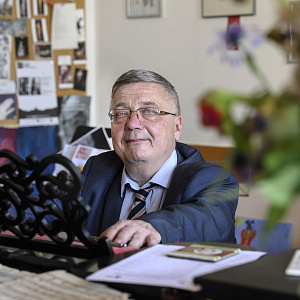
MARTIN BALLÝ
GENERIC INTERVIEW


The pianist and teacher Martin Ballý is a truly extraordinary figure. The top-notch Czech pianists Jan Bartoš and Miroslav Sekera have often referred to him as having had a huge impact on their maturing as artists. Other noteworthy students of Ballý’s include the distinguished conductors Jiří Rožeň and Marek Šedivý. Apart from being a renowned teacher, Ballý has been a remarkable musician too. Before a hand injury and improper subsequent treatment put an end to his career as a concert performer, Ballý was a sought-after interpreter, primarily of the 20th–century repertoire, and a member of Ars Trio, along with the violinist Dana Vlachová and the cellist Jan Páleníček. The recently discovered archival recordings, featured on a 3-CD album released on Supraphon, capture performances of Ars Trio, as well as the artistry of Martin Ballý’s as a soloist. They were made between 1980 and 1992. We talked with Martin Ballý prior to the release of the album.
The recordings contained on the triple album were made decades ago. How come they are only being released on CD now?
I was approached by the pianist Jan Bartoš, a former pupil of mine, who suggested that we listen to recordings he had found in archives. Initially, I was not at all keen on the idea, as I did not believe that I had made that many quality recordings. But while we were listening to them, I was quite surprised. They were not bad at all! At the same time, however, I realised how much I missed playing and the excitement from live performance.
The CD set comprises true gems of chamber and solo music. Let us focus on some of them, starting with Miloslav Kabeláč’s 1956 Eight Preludes for Piano, Op. 30.
Along with Martinů, I deem Kabeláč the greatest Czech post-war composer. Although living in total isolation, abandoned and ostracised by the Communist regime, he gained global fame … Ignoring the ban on Kabeláč’s music, my teacher Erna Grünfeldová told me to learn his Preludes, adding that we’d go and play them for him. I was young and thought that I could “improve” the music, make it even more eruptive. Suddenly I heard him scolding me: “Please stick to the score. There is no need to add anything.” That was a great lesson, which later on I would appreciate.
Why was your teacher Josef Páleníček important for your artistic development?
Páleníček was an amazing teacher. He enhanced musicality in his pupils. At the beginning of a lesson, he’d sometimes ask: “Shouldn’t we actually pay for being allowed to play?” And he opened my eyes in many a respect. Among other things, he revealed to me the secret of fingering. I recall him standing by the window, saying: “I wouldn’t do it that way, use a thumb instead.” I wondered how he could know that, but then it dawned on me that thumbs are important for the sound and harmony. Páleníček was absolutely dedicated to music. After his lessons, I was so elated that I danced on the embankment.
Thanks to Dana Vlachová, your partner in Ars Trio, you also took tutorials from her father, the legendary musician Josef Vlach. How do you recollect those consultations?
I remember playing Dvořák’s Dumky (also featured on the new album) for the Czech Trio. When we finished, Páleníček turned to Josef Vlach: “So what do you think? Those children of ours!” And Vlach, a deeply religious man, replied: “I think they could go to church sometimes.” That was it. I will never forget what he said. And I must confess I was afraid of Vlach! Not because he was so strict, but he came across as very intransigent. After all, he was nicknamed “Gentle Dictator”. He was very uncompromising, insisting that everything had to be performed in line with what he had said. Now and then, it was quite exhausting. The new album also contains music by Mozart and Vítězslav Novák – our best recordings, reflecting Vlach’s influence.
When did you perform with Ars Trio for the last time?
In 1992, at a concert in Brussels. My Ars Trio colleagues were friends come rain or shine.
How did you, a superb pianist, cope with the fact that after sustaining the injury you would not be able to play?
God has blessed me with excellent pupils.